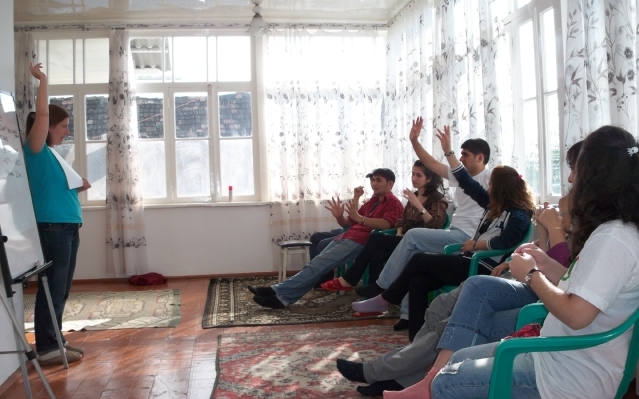Page 73 • (3,667 results in 0.06 seconds)
-
Information in the Time of COVID-19Updated January 14, 2020 at 8:45am. This webpage provides guidance and information given the unique situation of teaching and learning during the COVID-19 pandemic. This information is compiled based on information and emerging policies from the university, Education Department, The Professional Educator Standards Board (PESB), and questions submitted by students. We will update the content as new information becomes available and we further adapt our
-

March 20, 2013 Raechelle Baghirov ’05 teaching in Azerbaijan with the Peace Corps. (Photo provided by Raechelle Baghirov) In pursuit of wild hope in Azerbaijan By Katie Scaff ‘13 Discovering your wild hope doesn’t end when you leave PLU, just ask Raechelle Baghirov ’05. After graduating, Baghirov spent three years volunteering with the Peace Corps in Azerbaijan, where she learned much more than a foreign language. “The phrase ‘a life of service’ was thrown around a lot. Professors would talk
-
are limitless. Software is a fundamental part of modern life. Most of what we do runs on software and the world needs quality people to create that software. We strive to educate our students to be responsible citizens, critical thinkers, effective communicators, and to value life-long learning. Employers value our students for their technical ability, broad education, and excellent communication skills. The Computer Science program at Pacific Lutheran University provides a broad base of
-
personally, and the challenge of getting used to a new setting is part of that learning experience. Some students experience homesickness, which is a normal part of studying away, and is also a chance for students to build and strengthen self care and well being strategies. Frequent communication with family and friends back home can lead to less cultural engagement and language learning. One of the main differences for commuter students is that the cost of semester study away includes room and board
-
English language proficiency, if your first language is other than English. (Note: PLU does not provide fee waivers or coupons for English language tests) Copy of your passport photo page What are your English proficiency requirements?Applicants whose native language is not English must demonstrate English language proficiency. Proficiency can be demonstrated in multiple ways, such as through official English test scores or by completing secondary school in certain countries and where English is the
-

PLU. Above is a photo from senior Kelly Hall's youth Tribal Canoe Journey (courtesy of Hall). “I was lucky there was a group already making this major,” Hall said. “I get to kind of be the guinea pig.” So, an independently designed major was created and approved. Focusing on the four disciplines of religion, anthropology, history and language, Hall and Crawford-O’Brien came up with a list of classes for Hall to choose from. Now a senior, the only thing between Hall and graduation is her capstone
-
approved translation services if the transcripts and documents are in a language other than English. PLU reserves the right to request further evaluation by an approved credential evaluation agency. Refer to individual program websites for the list of approved evaluation agencies. Demonstrated University-level Proficiency in the English Language Proficiency in English is required for graduate study at Pacific Lutheran University. Applicants whose native language is not English must demonstrate English
-
General information about the centerThe Language Resource Center is located on the first floor of Kriedler Hall as part of Hong Global Hall. Currently the center is equipped with 3 PC workstations, one Mac, CD/cassette players, print resources such as magazines, and a printer. Tutors are available for appointments that you can schedule for free using Knack to assist with with language questions and conversation practice. International Coffee Hour in the LRC
-
language impacts cultural and personal memory. Set in Pakistan in the early 2000s, the novel follows Alys Binat and her sisters as they navigate the marriage market, female identity, and British and Pakistani influences on their self-expression. Kamal translates “What will people say?” into Urdu: ” کہیںگے/ Log kya kahenge” (35). She applies a post-colonialist perspective to the question by asking not only how society will judge an individual’s actions, but how Pakistan will speak for itself as it works
-
a language other than English. PLU reserves the right to request further evaluation by an approved credential evaluation agency. World Education Services (WES) is the preferred agency. Please follow these steps: Go to either www.wes.org and follow their instructions to order a credential evaluation. Request your schools to send official transcripts directly to either WES. If your schools send official transcripts to WES, they do not need to send the transcripts to PLU. Request WES send their
Do you have any feedback for us? If so, feel free to use our Feedback Form.


